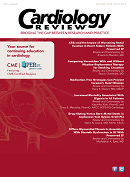Publication
Article
Cardiology Review® Online
Study of Clot-Grabbing Stent Is Grabbing Attention
Author(s):
A recent study has generated a great deal of excitement because Dutch researchers reported that a new intra-arterial treatment greatly improves the prognosis for people with acute ischemic stroke caused by a proximal intracranial arterial occlusion of the anterior circulation.
Study of Clot-Grabbing Stent Is Grabbing Attention
A study published online in The New England Journal of Medicine has generated a great deal of excitement because Dutch researchers reported that a new intra-arterial treatment greatly improves the prognosis for people with acute ischemic stroke caused by a proximal intracranial arterial occlusion of the anterior circulation. The investigators used a retrievable stent within 6 hours of stroke onset to remove large blood clots, enabling many patients to return to an independent life (The New York Times, December 17, 2014).

About a third to a half of the 630,000 Americans who have strokes each year have clots in a large vessel, a situation in which tissue plasminogen activator (tPA) often does not help. Until now, no other treatments had been shown to work.
The new study, known as MR CLEAN, followed 500 stroke patients, 90% of whom received tPA. Retrievable stents were used in 190 of the 233 patients assigned to intra-arterial treatment. There was an absolute different of 13.5 percentage points in the rate of functional independence in favor of the intervention and no significant difference in mortality or the occurrence of symptomatic intracerebral hemorrhage. The Times article quotes Dr. Larry B. Goldstein, director of the Duke Stroke Center, as calling the findings a significant and meaningful improvement in what stroke patients are able to do. Dr. Ralph L. Sacco, chairman of neurology at the University of Miami’s Miller School of Medicine, called the finding a sea change.
Two other trials similar to the Dutch study have ended early because the results were so positive. The results will be presented in February at the International Stroke Conference.
References
1. Taggart DP, Banning AP. Stents and failing vein grafts: are we any wiser after ISAR? Lancet. 2011;378(9796):1054-1055.
2. FitzGibbon GM, Kafka HP, Leach AJ, Keon WJ, Hooper GD, Burton JR. Coronary bypass graft fate and patient outcome: angiographic follow-up of 5,065 grafts related to survival and reoperation in 1,388 patients during 25 years. J Am Coll Cardiol. 1996;28(3):616-626.
3. Aggarwal V, Stanislawski MA, Maddox TM, et al. Safety and effectiveness of drug-eluting versus bare-metal stents in saphenous vein bypass graft percutaneous coronary intervention. J Am Coll Cardiol. 2014;64:1825-1836.
4. Wiisanen ME, Abdel-Latif A, Mukherjee D, Ziada KM. Drug-eluting stents versus bare-metal stents in saphenous vein graft interventions: a systematic review and meta-analysis. JACC Cardiovasc Interv. 2010;3(12):1262-1273.
5. Mehilli J, Pache J, Abdel-Wahab M, et al. Drug-eluting versus bare-metal stents in saphenous vein graft lesions (ISAR-CABG): a randomised controlled superiority trial. Lancet. 2011;17;378(9796):1071-1078.
6. Levine GN, Bates ER, Blankenship JC, et al. 2011 ACCF/AHA/SCAI Guideline for Percutaneous Coronary Intervention. A report of the American College of Cardiology Foundation/American Heart Association Task Force on Practice Guidelines and the Society for Cardiovascular Angiography and Interventions. J Am Coll Cardiol. 2011;58(24):e44-e122.
7. Windecker S, Kolh P, Alfonso F, et al. 2014 ESC/EACTS Guidelines on myocardial revascularization: The Task Force on Myocardial Revascularization of the European Society of Cardiology (ESC) and the European Association for Cardio-Thoracic Surgery (EACTS). Developed with the special contribution of the European Association of Percutaneous Cardiovascular Interventions (EAPCI). Eur Heart J. 2014;35(37):2541-2619.
8. Drug-Eluting Stents vs. Bare Metal Stents In Saphenous Vein Graft Angioplasty (DIVA) study. Clinical trials website. http://clinicaltrials.gov/show/NCT01121224





